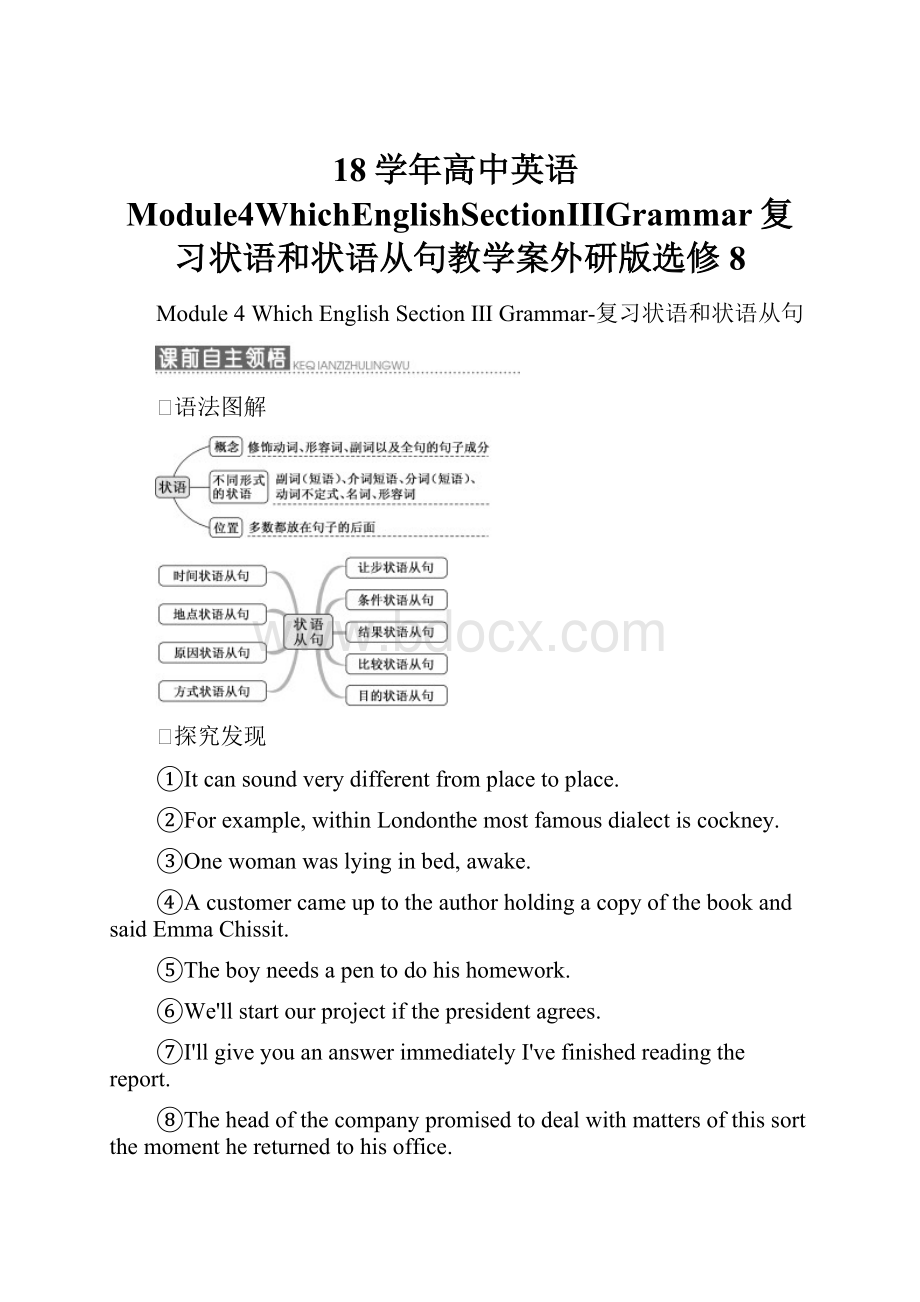18学年高中英语Module4WhichEnglishSectionⅢGrammar复习状语和状语从句教学案外研版选修8.docx
《18学年高中英语Module4WhichEnglishSectionⅢGrammar复习状语和状语从句教学案外研版选修8.docx》由会员分享,可在线阅读,更多相关《18学年高中英语Module4WhichEnglishSectionⅢGrammar复习状语和状语从句教学案外研版选修8.docx(13页珍藏版)》请在冰豆网上搜索。

18学年高中英语Module4WhichEnglishSectionⅢGrammar复习状语和状语从句教学案外研版选修8
Module4WhichEnglishSectionⅢGrammar-复习状语和状语从句
语法图解
探究发现
①Itcansoundverydifferentfromplacetoplace.
②Forexample,withinLondonthemostfamousdialectiscockney.
③Onewomanwaslyinginbed,awake.
④AcustomercameuptotheauthorholdingacopyofthebookandsaidEmmaChissit.
⑤Theboyneedsapentodohishomework.
⑥We'llstartourprojectifthepresidentagrees.
⑦I'llgiveyouananswerimmediatelyI'vefinishedreadingthereport.
⑧Theheadofthecompanypromisedtodealwithmattersofthissortthemomenthereturnedtohisoffice.
⑨Poorashewas,hewashonest.
[我的发现]
(1)①~⑤句为词语作状语,⑥~⑨句为句子作状语。
(2)④⑤为非谓语动词作状语。
(3)⑥句中的条件状语从句用一般现在时代替一般将来时。
(4)⑦句用副词引导状语从句;⑧句用名词性短语引导时间状语从句。
(5)⑨句中的状语从句使用了倒装语序。
一、状语
(一)概念
修饰动词、形容词、副词以及全句的句子成分,叫作状语。
用作状语的通常是副词、介词短语、不定式和从句等。
状语一般放在被修饰的词之后或放在句尾。
副词作状语时可放在被修饰的词前或句首。
(二)不同形式的状语
1.副词(短语)作状语
Theboyneedsapenverymuch.
男孩非常需要一支钢笔。
(程度状语)
Theboyneedsapennow./Nowtheboyneedsapen./Theboynowneedsapen.
男孩现在需要一支钢笔。
(时间状语)
2.介词短语作状语
BeforehismotherTomisalwaysaboy.
在母亲面前,汤姆总是个孩子。
(地点状语)
OnSundays,thereisnostudentintheclassroom.
星期天,教室里没有学生。
(时间状语)
3.分词(短语)作状语
Hesitsthere,askingforapen.
他坐在那儿要一支笔。
(表示伴随状态)
4.动词不定式作状语
WeweregladtohearthatShenzhouXⅠhadbeensentupintospacesuccessfully.
听到神舟十一号成功发射的消息我们很高兴。
(原因状语)
5.名词作状语
Comethisway!
走这条路!
(方式状语)
IwillbebacknextMonday.
我下周一回来。
(时间状语)
6.形容词作状语
Tiredandhot,wehadtostoptohaveabreak.
又累又热,我们只好停下来休息。
(原因状语)
(三)位置
状语在句中的位置比较灵活。
一般来讲,多数状语都放在句子的后面。
修饰谓语动词的状语一般放在谓语的后面,若有宾语则放在宾语的后面。
修饰整个句子的状语则放在句子的最前面,并用逗号隔开。
但有些副词作状语则放在实义动词之前,助动词、be动词或情态动词之后,如always,often,usually,never,ever等。
Shestudieshardatschool.
她在学校努力学习。
ShestudiesEnglishveryhardatschool.
她在学校学习英语很努力。
Unfortunately,hemissedthetrain.
不幸的是他未赶上火车。
Heisalwayslateforschool.
他总是上学迟到。
[即时演练1] 画出下列句子中的状语
①Itsoundsverydifferentfrom_place_to_place.
②Full_of_hope,_thelocalpeopleareworkinghardto_rebuild_their_hometown.
③Having_lived_abroad_for_twenty_years,_theoldmanreturnedtohishometownwherehewasbroughtup.
④Iwillstayanother_five_months.
⑤Heated,_waterchangesintosteam.
⑥In_spite_of_the_heavy_rain,_theyarrived.
⑦Alwayslookyourhomeworkthroughbefore_handing_it_in.
二、状语从句
(一)状语从句的概念及分类
用来修饰谓语动词、其他动词、定语、状语或整个句子的从句叫作状语从句。
可分为时间、条件、原因、让步、比较等状语从句。
(二)各种状语从句的具体用法
1.时间状语从句
时间状语从句常由以下引导词引导:
when;while;as;before;after;since;until;assoonas;nosooner...than...;hardly...when;themoment;everytime;immediately等。
A.when,while,as引导的时间状语从句
(1)when表示时间点时,从句中用短暂性动词;表示时间段时,用延续性动词。
YouhadalreadygonewhenIarrivedthere.
当我到达时,你已经走了。
(when表示点时间)
WhenIlivedinthecountryside,Iusedtocarrysomewaterforhim.
当时住在农村,我常常为他担水。
(when表示段时间)
(2)while表示“在……期间”或“在某一段时间里”,它所引导的从句的动作是延续性的,并侧重表示和主句动作的同时发生。
Samwentthroughamagazinewhilehewaited.
萨姆一边等着一边翻阅杂志。
(3)as引导的时间状语从句
①as表示从句的动作与主句的动作同时发生,一般与延续性动词连用。
AsIwatchedthem,anideastruckme.
我看着他们时,产生了一个想法。
②as表示“一边……一边……”,强调从句和主句中两个动作交替进行或同步进行。
Asthestudentswalkedtotheirdorms,theysanghappily.
学生们一边往宿舍走,一边快乐地唱着歌。
③as还可以说明两种正在发展或变化的情况,意为“随着”,表时间的推移。
Astimegoeson,it'sgettingwarmerandwarmer.
随着时间的推移,天气变得越来越暖和了。
B.since引导的时间状语从句
since表示从过去某一时间或动作、事情起到目前为止,意思是“自……以来”。
引导状语从句时,主句用现在完成时或现在完成进行时,since从句中一般用短暂性动词的一般过去时。
We'vebeenfriendseversincewemetatschool.
自从我们在学校认识之后,我们就一直是好朋友。
C.before,after引导的时间状语从句
(1)before表示在一段时间之前。
after表示在一段时间之后。
Ihadwrittenmydissertationbeforemysupervisorwentabroad.
在导师出国之前,我已完成了我的学位论文。
Ifoundyourcoatafteryouhadleftthehouse.
你离开房子之后,我发现了你的外衣。
(2)before有时翻译成“……才……”,“不到……就”,“趁……就”,“还没(来得及)……就”。
Itwasquiteafewyearsbeforehefinallyfinishedhisnovel.
过了好几年他才完成他的小说。
HeranoffbeforeIcouldstophim.
我还没来得及阻止他,他就跑掉了。
D.till,until引导的时间状语从句
(1)如果主句的谓语动词是延续性动词,就常用肯定式表示“直到……为止”;如果主句的谓语动词是瞬间动词,就常用否定表示“直到……才”。
Hewillremainincollegeuntil(till)hefinisheshisPh.Dcourse.
他将留在学校里面直到完成他的博士学位课程。
Ididn'twakeupuntilIheardthealarmclock.
直到听到闹钟的铃声我才醒来。
(2)当notuntil位于句首时,主句中的主语、谓语要使用倒装语序。
NotuntilhecamebackdidIleave.
直到他回来我才走。
[名师点津] ①until引导的从句可以放在主句之前或主句之后,但till从句一般不放在句首。
②在强调句型中一般只能用until,不用till。
ItwasnotuntilshetookoffherdarkglassesthatIrecognizedher.
直到她摘下墨镜,我才认出她来。
E.表示“一……就……”的时间状语从句
assoonas,once,immediately,instantly,directly,themoment,theminute,theinstant,thesecond,nosooner...than,hardly...when,scarcely...when等引导的从句都表示从句的动作一发生,主句的动作随即就发生了,即“一……就……”。
Assoonaswegothome,thetelephonerang.
我们刚到家,电话就响了。
Hesaidhe'dturnonTVthemomenthegothome.
他说他一回到家就打开电视机。
[名师点津] ①hardly/scarcely...when,nosooner...than引导的从句中的动词用一般过去时,主句中的动词用过去完成时。
②当hardly,scarcely,nosooner位于句首时,主句应用倒装语序。
Ihadhardlyarrivedatthetheatrewhentheperformancebegan.
我刚到剧场,节目就开始了。
F.nexttime,thefirsttime,thelasttime,everytime,bythetime等引导的时间状语从句
Dolookmeupthenexttimeyou'reinLondon.
你下次到伦敦,务必来找我。
Bythetimewegotthere,theplayhadalreadybegun.
等我们到那里时,戏已经开始了。
[即时演练2]
(1)选词填空
when,while,as,before,after,since,until,themoment
①The_momentIheardthenews,Irushedtothespot.
②Whenshecamein,Iwascookingdinner.
③Whilemywifewasreadingthenewspaper,IwaswatchingTV.
④Astimegoeson,thingsaregettingbetterandbetter.
⑤Ididn'tgotobeduntilmyfathercameback.
⑥MyfatherhadleftforCanadajustbeforetheletterarrived.
⑦Aftershehadfinishedherdinner,Lucybegantoreadanovel.
⑧Itisfivedayssincehecamehere.
(2)完成句子
①Not_untiloneofmyclassmatespattedmeontheshoulderdid_Icometomyself.
直到我的同班同学拍了一下我的肩膀,我才回过神来。
②Nosoonerhad_she_heard_the_news_thanshefainted.
她一听到这个消息,便昏了过去。
③Itwon'tbelongbeforewemeetagain.
用不了多久我们就会再见面的。
2.让步状语从句
让步状语从句由although,though,while“虽然,尽管”,as,evenif,eventhough“即使……也……”,however,whatever,whoever,whomever,whichever,whenever,wherever,whether...or...“不管……还是……”,nomatterhow(who,what...)等引导。
Althoughtheylackofficialsupport,theycontinuetheirstruggle.
他们虽然没有得到官方的支持,但仍然继续奋斗。
Evenifyoufail,youwillhavegainedexperience.
纵然失败,你也会得到一些经验。
[即时演练3] 完成句子
①(2016·浙江高考改编)While/Although/Though_online_shopping_has_changed_
our_life,_notallofitseffectshavebeenpositive.
虽然网购改变了我们的生活,但并不是它的所有影响都是正面的。
②However_hard_it_rained,_theywentonhiking.
不管雨下得多大他们仍继续徒步旅行。
③No_matter_who_you_are,_youmustobeythelaw.
不管你是谁,都要守法。
④Whether_he_will_come_or_not,_wewillgoonwithourplan.
不管他来不来,我们仍按计划进行。
⑤Child_as_he_was,_hehadagoodcommandofEnglish.
尽管他是个孩子,但他精通英语。
3.条件状语从句
条件状语从句由if“如果”,unless“除非”,aslongas(=solongas)“只要”,incase(that)“如果,万一”,onconditionthat“条件是”,suppose,supposingthat,provided,providingthat“假如”等引导。
IwillbuyacomputerifIamabletosaveupenoughmoney.
如果我能存下足够的钱,我就买台电脑。
Unlesstheweatherwasbad,myfatheralwaysusedtotakeawalkintheevening.
除非天气不好,我的父亲过去晚上总是去散步。
[即时演练4] 选词填空
①Ifheworkshard,he'llbesuccessful.
②Youmayborrowthebook,on_condition_thatyouwon'tlendittoothers.
③Supposing(that)youfailasecondtime,tryagain.
④As_long_aswedon'tloseheart,we'llfindawaytoovercomethedifficulty.
⑤Itmayrain,you'dbettertakeanumbrella(just)in_caseitdoes.
4.地点状语从句
地点状语从句常由where或wherever等引导。
Wherethereisawill,thereisaway.
有志者,事竟成。
Hemustgowhereverwesendhim.
他必须去我们派他去的任何地方。
5.原因状语从句
原因状语从句由because,as,since,nowthat等引导。
Ididn'tgotoschooltodaybecauseIwasill.
因为生病所以我今天没去上学。
Astherewasnoanswer,hewrotetoheragain.
因为没有回复,所以他又给她写了封信。
6.结果状语从句和目的状语从句
(1)引导结果状语从句的连词有:
so...that,such...that“如此……以至于”,sothat“以至于,所以”。
结果状语从句通常置于主句之后。
Ididn'tplantheworkwell,sothatIdidn'tfinishitintime.
我没把工作计划好,结果没按时完成。
Thescientist'sreportwassoinstructivethatwewereallveryexcited.
科学家的报告很有教育性,我们感到很兴奋。
(2)引导目的状语从句的连词有:
sothat,inorderthat,lest,forfearthat,incase。
Theystartedearlysothattheymightarriveintime.
他们早点动身,以便准时到达。
Bettertakemoreclothesincasetheweatheriscold.
最好多带些衣服以防天气会冷。
7.方式状语从句和比较状语从句
(1)方式状语从句常由as,asif,asthough等词引导,通常位于主句之后。
Heactedasif/thoughnothinghadhappened.
他装作似乎什么事也没发生过。
(2)比较状语从句由as...as,more...than,themore...,themore...等引导。
Ournewschoolisfourtimesasbigastheoldone.
我们的新学校是原来学校的四倍大。
[即时演练5] 单句改错
①You'llgotoanywhereyoulike.去掉to
②Itwasashewaslateforclassthathewasscoldedbytheteacher.as→because
③Inordertowecouldsavetime,weusedthecomputer.to→that
④Therearesuchmanymistakesinthepassagethatnoonelikestoreadit.such→so
⑤HetreatsmeasifIamastranger.am→were
Ⅰ.单句语法填空
1.Atnightthesebusystreetsduringthedaybecomeemptyoftraffic.
2.Childrenshouldbeinstructedtoputthingswheretheybelongintheirearlychildhood.
3.Everythingseemedtobegoingsmoothly(smooth)forthefirsttwodaysafterImovedtoNewYork.
4.Finding(find)thecourseverydifficult,shedecidedtomovetoalowerlevel.
5.Unlesswehaveenoughevidence,wecan'twinthecase.
6.Doasyouaretold,otherwiseyouwillmakemistake.
7.Theturtledoesn'trunsoquicklyasthehare.
8.Shecouldhardlysayaword,astonished(astonish)andhappy.
9.Shehadtochokedownherbreakfastto_catch(catch)herbus.
10.ThebellrangbeforeIcouldlookovermyanswers.
Ⅱ.完成句子
1.(2015·四川高考书面表达)When_I_speak_English,_Ioftenfeelalittlenervous.
当我说英语的时候,我经常感到有点紧张。
2.(2014·山东高考满分作文)Thisprovesthatas_long_as_we_have_a_strong_will,_we'llbeabletogetoveranydifficulty.
这证明,只要我们有坚强的意志,我们将能够克服任何困难。
3.(2015·全国卷Ⅰ满分作文)First_of_all,_youcantalkaboutAmericancustomsandfestivalsbecauseChinesestudentsareinterestedinthem.
首先,你可以谈论美国的习俗和节日,因为中国学生对他们感兴趣。
4.(2014·四川高考书面表达)Though_some_of_the_questions_seem_unfamiliar_to_me,_theyareeasytoanswer.